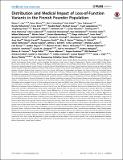Distribution and Medical Impact of Loss-of-Function Variants in the Finnish Founder Population
Author(s)
Altshuler, David
DownloadLim-2014-Distribution and Med.pdf (774.5Kb)
PUBLISHER_CC
Publisher with Creative Commons License
Creative Commons Attribution
Terms of use
Metadata
Show full item recordAbstract
Exome sequencing studies in complex diseases are challenged by the allelic heterogeneity, large number and modest effect sizes of associated variants on disease risk and the presence of large numbers of neutral variants, even in phenotypically relevant genes. Isolated populations with recent bottlenecks offer advantages for studying rare variants in complex diseases as they have deleterious variants that are present at higher frequencies as well as a substantial reduction in rare neutral variation. To explore the potential of the Finnish founder population for studying low-frequency (0.5–5%) variants in complex diseases, we compared exome sequence data on 3,000 Finns to the same number of non-Finnish Europeans and discovered that, despite having fewer variable sites overall, the average Finn has more low-frequency loss-of-function variants and complete gene knockouts. We then used several well-characterized Finnish population cohorts to study the phenotypic effects of 83 enriched loss-of-function variants across 60 phenotypes in 36,262 Finns. Using a deep set of quantitative traits collected on these cohorts, we show 5 associations (p<5×10[superscript −8]) including splice variants in LPA that lowered plasma lipoprotein(a) levels (P = 1.5×10[superscript −117]). Through accessing the national medical records of these participants, we evaluate the LPA finding via Mendelian randomization and confirm that these splice variants confer protection from cardiovascular disease (OR = 0.84, P = 3×10[superscript −4]), demonstrating for the first time the correlation between very low levels of LPA in humans with potential therapeutic implications for cardiovascular diseases. More generally, this study articulates substantial advantages for studying the role of rare variation in complex phenotypes in founder populations like the Finns and by combining a unique population genetic history with data from large population cohorts and centralized research access to National Health Registers.
Date issued
2014-07Department
Massachusetts Institute of Technology. Department of BiologyJournal
PLoS Genetics
Publisher
Public Library of Science
Citation
Lim, Elaine T., Peter Würtz, Aki S. Havulinna, Priit Palta, Taru Tukiainen, Karola Rehnström, Tõnu Esko, et al. “Distribution and Medical Impact of Loss-of-Function Variants in the Finnish Founder Population.” Edited by David Cutler. PLoS Genet 10, no. 7 (July 31, 2014): e1004494.
Version: Final published version
ISSN
1553-7404